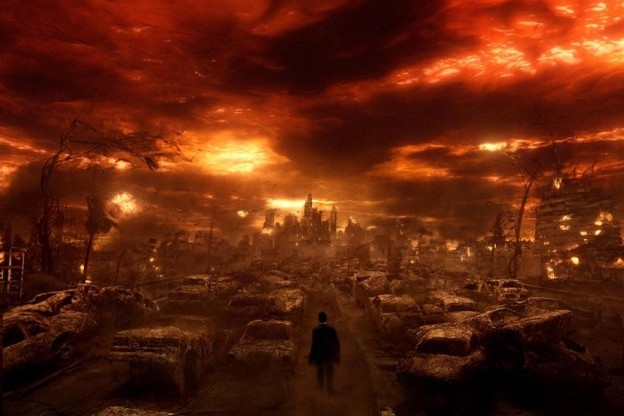
Archeologists: Book of Revelation out!
I am migrating a few of my favorite posts over to the new site. Here’s one that was originally published on July 4, 2007.
(SNS) – Rome. In a stunning announcement, a team of archeologists and Bible scholars said they had uncovered conclusive proof that the Book of Revelation, also sometimes called, not entirely facetiously, the Gospel According to Fellini, was not intended to be part of the Bible canon. The news was greeted with joy in some circles, but not all. The Biblical prophecy and Rapture industries saw a steep decline in share prices, and the evangelical Christian churches reacted with disdain.
In a news conference, a spokesman for the group said that records had been discovered which revealed irregularities in the proceedings leading up to the declaration by Pope Damascus I in 382 of the writings to be included in the book we know as the Christian Bible today. The archeologists found evidence that the Book of Revelation was surreptitiously put on the list at the last minute by an anonymous staffer to the Pope. This individual was apparently a member of a fringe sect called the “psychedelics.”
Although the author of the Book of Revelation was considered by some early church authorities as the Apostle John — the beloved disciple — scholarship has cast great doubt on that claim. It is unlikely that the book’s author knew Jesus. The bid to include Revelation was based in part on the claim that its author was a disciple of Jesus.
Who was the author of the Book of Revelation? Sometimes referred to as John the Divine, he is almost certainly John of Patmos, a man living in exile on a Greek island by that name at the time Revelation was written. It is not known why John had been exiled to Patmos, but speculation among scholars is that it was because of John’s cultivation of herbs and fungi that John claimed had “medicinal” properties, and that he was selling things he called “tabs” and “shrooms” to the local youth.
John of Patmos was the founder of the counter-culture community that became known as the “psychedelics.” He used to tell wild, visionary stories, and he was urged by his friends to write them down. Some experts say that John of Patmos was the first science fiction writer.
The archeologists found evidence that John of Patmos’ work was regarded variously as “odious,” “ghastly,” or “revolting” by his detractors, and “cool” by his buds. His work remained controversial and was thought to have been rejected by most Christian theologians in discussions and correspondence leading up the Council of Rome.
However, based on the new record just discovered, it appears that a descendent of one of the early “psychedelics” received an appointment to the Pope’s staff, and that the background check was insufficient to reveal his loyalties. As the staffer or clerk with the best penmanship, and therefore tasked to write the final draft of the Pope’s proclamation, this “psychedelic mole” literally added the Book of Revelation to the Bible canon at the last moment. This probably accounts for its position as the last book of the Bible.
The implications of this discovery are, of course, immense. When reached for comment, Pope Benedict said that he would instruct Catholic publishers to delete this last book from the Bible, adding wistfully that he “would miss the old Holy Smoke.”
Church officials at the Cathedral of St. John the Divine said they had a change of the cathedral’s name under consideration.
Evangelicals in the United States reacted with disbelief and dismay. When asked about the Pope’s action in response to the find, some Lutherans [Wisconsin Synod] reacted cautiously, saying that, of course, the Pope was the Anti-Christ.
Jan Markell, a mouthpiece for the Olive Tree Ministries, said, “There is so much neat stuff in the Book of Revelation: a lake of fire, apocalyptic battles, the fall of Satan, the Rapture, that it just has to be true. I have spent my whole life on this mapcap fantasy, and I am not about to let it go now!”
It is clear that this revelation, so to speak, has the power to turn Christianity upside down.
(This story was prepared with the assistance of Chris Hedges.)
N.B. This post was written shortly after I read an article (that I can’t find now) about recent archaeological findings about the controversy surrounding the inclusion of the Book of Revelation when the final Bible canon was established. The point was, and is, that there were a lot of early clerics who didn’t put much stock in John of Patmos and his revelation, either. There is also some evidence that it was written about the time of the fall of Jerusalem and was intended as a little cheer-up for the Jewish people who were at the time it was written under the thumb of the Romans.
Thanks for your feedback. If we like what you have to say, it may appear in a future post of reader reactions.


